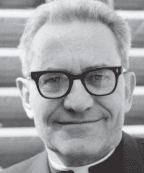Leo McLaughlin (1931-1932)
Leo McLaughlin's one year on the Georgetown varsity was a prelude to a 30 year career in Jesuit higher education.
Following his sophomore season, where he played in 15 games for the basketball team, McLaughlin took what would now be known as a study abroad opportunity, studying at the Sorbonne in 1933 and joining the Jesuit order before returning to campus. He completed his baccalaureate degree at Georgetown in 1934 and completed a postgraduate degree at Catholic University in 1940.
In the years following his ordination, McLaughlin served as dean of students at St. Peter's College in the late 1950's and held the same role at Fordham University in the early 1960's. McLaughlin was installed as president at Fordham in 1965 and ushered in perhaps the most tumultuous period in that school's history.
"McLaughlin was the Jesuit answer to the 1960's," wrote the New York Times. "As a transforming president of Fordham from 1965 to 1969, he opened up the curriculum beyond traditional theological courses, encouraged academic experimentation, fought for higher faculty salaries even as he was turning the established Jesuit faculty inside out, brought Marshall McLuhan to Fordham as a professor and even wrested the university from Jesuit control."
Not of all of McLaughlin's innovations were well received, however. He proposed a plan of accelerated study where Fordham Prep grads could receive a university degree within two years. A plan to make Fordham completely independent of Jesuit control to take advantage of state-funded financial aid was seen as controversial. An experimental college was created, enrolling students who would live communally with faculty off campus and not be subject to courses or even grades. The only requirement of the college was to study the Urdu language, largely because one faculty member found it a novel concept.
McLaughlin's innovations had a more immediate impact--the school was losing money, and thus losing support among trustees and his fellow Jesuits. As such, he was forced out after just three years as president. One of his leading supporters was Fordham's executive vice president, Timothy S. Healy, S.J., who served as president of Georgetown University from 1976 to 1989.
"I still regard the loss of Leo McLaughlin as a deadly blow to [Fordham], but I suspect that is not a popular opinion, nor a very general one," Healy remarked. "It's fascinating that the people who shot him down profited largely from absolutely everything he had done. Here was a man who unfortunately thought ahead of his time, and in those days at Fordham that was an unforgivable sin."
Though promoted to the honorific of chancellor, McLaughlin soon left Fordham to become director of freshman studies at Johnson C. Smith College, a historically black college in Charlotte, and later taught at Ramapo College. McLaughlin was excommunicated in 1973 when, while still a Jesuit, he married a 26 year old woman in a civil ceremony. When asked why he did not wait for approval to be relieved of his vows, McLaughlin told the New York Times: "Impatience, I guess. I'm not young and a year is a long time to wait."
Following the death of his wife in 1994 and in declining health, McLaughlin spent his final years at the Jesuit infirmary on the Fordham campus.
| Season | GP | GS | Min | FG | FGA | % | 3FG | 3GA | % | FT | FTA | % | Off | Reb | Avg | PF | Ast | Blk | Stl | Pts | Avg |
|---|---|---|---|---|---|---|---|---|---|---|---|---|---|---|---|---|---|---|---|---|---|
| 1931-32 | 15 | 23 | 1.5 | ||||||||||||||||||
| Totals | 15 | 23 | 1.5 |
